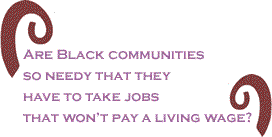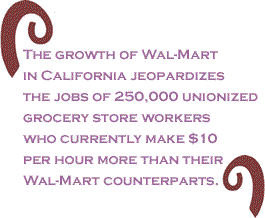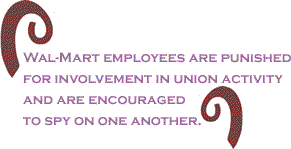
|
|||||||||||||||||||||
|
The retailing giant Wal-Mart must be nirvana for Black people. Its commercials, full of sentimental background music, soft focus photography, and earnest looking real people give the impression that it is just short of heaven on earth. I have seen commercials showing a Black mother exhorting her daughter to pursue a career at Wal-Mart. In another we are told that the Crenshaw area of Los Angeles was saved by Wal-Mart. By occupying an empty space Wal-Mart brought jobs, hope, love, respect, and good karma to this community. A discount store had accomplished what urban planners, academics, and politicians could not. Wal-Mart is the nation’s largest retailer and with 1.2 million workers the largest employer as well. It prevents union organizing on its sites, and before being sued forced employees to work overtime but did not pay them for doing so. The American desire for a good bargain has created a retailing behemoth with low prices and low wages to match. Wal-Mart had already cut a swath across mostly rural America by putting smaller retailers out of business. But the giant that began as a five and dime store in Bentonville, Arkansas is now conquering new territory. Apparently some among Black leadership believe that businesses, no matter how exploitative, are always good for their needy communities. John Mack, President of the Los Angeles Urban League, said, “We need to have retail outlets that are convenient and offer quality goods and services at low prices. I really think that there are potential economic benefits for this community with the addition of a Wal-Mart."
It may be a difficult choice for distressed communities to reject potential employers, but the growth of Wal-Mart in California jeopardizes the jobs of 250,000 unionized grocery store workers who currently make $10 per hour more than their Wal-Mart counterparts. The need to compete with Wal-Mart has sparked a strike in Southern California that began in October. Grocery stores want to reduce union worker benefits out of fear that they will be unable to compete with Wal-Mart’s low wages. Are Black communities so needy that they have to take jobs that won’t pay a living wage? Others are less enamored of Wal-Mart’s false image of love and happiness. The City of Oakland has passed legislation to prohibit so-called “big box” stores in an attempt to curb the threats that Wal-Martization presents to its residents. The issue of Wal-Mart’s supposed benefits to distressed neighborhoods raises the recurrent theme of economic activity, or lack of same, in Black communities. Communities with greater resources reject Wal-Mart and its ilk out of hand because of concerns about sprawl and destruction of neighboring businesses. It may be easier to say that Wal-Mart is better than nothing, but a corporation that has cheated employees out of wages and fires them because they are in interracial relationships makes the case that half a loaf is worse than none. It is understandable that John Mack and others are looking to increase employment, but what happens when the employer pays such low wages that its employees are eligible for public assistance? Some Wal-Mart employees in California were given information on how to apply for food stamps and other welfare benefits. Do Black neighborhoods really need more public assistance? I was under the impression that employment was supposed to end the need for public assistance, not provide for it.
Unfortunately, even some of Wal-Mart’s detractors miss the significance of its growth and paint it as some sort of aberration in the history of American capitalism. In fact Wal-Mart has perfected this system and the result is the logical conclusion of capitalism unrestrained. One can argue that it all works out. The Wal-Martization of America provides us with the lower cost goods we will all need when our wages are lowered by the Wal-Marts of the world. Black leadership should not give into the argument that our communities are in such need that Wal-Mart and its acts of harassment can be considered an asset. Wal-Mart employees are punished for involvement in union activity and are encouraged to spy on one another. Is it asking too much for these leaders to think of other ways to bring new employment opportunities or respond to redlining and other factors that keep businesses out of our neighborhoods? Apparently it is, and not just in Crenshaw. In my community, Harlem, the so-called capital of Black America, we hear much about redevelopment. Bill Clinton opening an office was supposed to bring a 180 degree change in the fortunes of our neighborhood. There are now large retailers such as Old Navy, Marshall’s, and H&M on 125th Street. I don’t argue against their presence, but we still lack the business development that is so much more evident in other Manhattan neighborhoods. Outside of the showcase that 125th Street has become there are still too many empty store fronts and those that exist are the usual fast food outlets, hair dressers, small churches, and check cashing places. When we do have vital businesses they often disappear. My favorite restaurant, Wilson’s, which had a bakery, waiter service and good, inexpensive food was open one week and closed the next without any explanation or warning. I went for an after church brunch to find a tiny note on the door that read “closed.” The space is now occupied by a Dominican restaurant, which is not surprising given the demographic changes to that part of Harlem. But the fate of Wilson’s and other Black owned businesses remains a mystery to once loyal customers and residents who desperately want to see a strong economic base in their neighborhoods.
My Walton relatives hail from the same region of Arkansas as the late Sam Walton, founder of Wal-Mart. My family would joke that perhaps we were related and were due some of the wealthy Walton cash. No one was able to substantiate any connection and our wishful thinking remained just that. Now I wish that the Black communities were not so downtrodden that an Old Navy opening was big news or that a bad employer might be welcomed with open arms. Margaret
Kimberley’s
Freedom Rider column appears weekly in |
January
8,
2004 |
|||||||||
|
|||||||||
|
|
|||||||||
| Printer Friendly Version | |||||||||
| |
|||||||||
| |
|||||||||




























